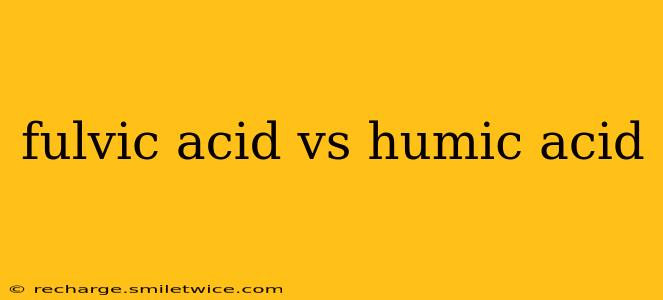Fulvic Acid vs. Humic Acid: Unveiling the Differences and Benefits
Humic and fulvic acids are both naturally occurring substances found in soil, formed by the decomposition of organic matter. While they share similarities, understanding their key differences is crucial for appreciating their distinct benefits in various applications, from agriculture to human health. This comprehensive guide will delve into the specifics, answering common questions and highlighting the unique properties of each.
What are Humic and Fulvic Acids?
Both humic and fulvic acids are complex organic molecules categorized as humic substances. They're the result of the breakdown of plant and animal matter by microorganisms over millennia. This process, called humification, creates a rich mixture of organic compounds with varying molecular weights and structures. The differences lie in their molecular size, solubility, and chemical composition.
H2: What is the difference between fulvic and humic acid?
The primary difference lies in their molecular size and solubility. Humic acids are larger, more complex molecules with higher molecular weights, making them less soluble in water. Fulvic acids, conversely, have smaller molecular weights and are highly soluble in water, even acidic water. This difference in solubility significantly influences their bioavailability and how they are utilized by plants and organisms. Furthermore, fulvic acid generally contains a higher proportion of oxygen-containing functional groups, leading to greater reactivity.
H2: What are the benefits of humic acid?
Humic acids offer a range of benefits, primarily in agriculture and soil improvement:
- Improved Soil Structure: Humic acids enhance soil aggregation, improving aeration and water retention. This leads to a healthier root environment for plants.
- Nutrient Availability: They help chelate essential nutrients, making them more readily available for plant uptake. This can reduce the need for synthetic fertilizers.
- Microbial Activity: Humic acids stimulate beneficial microbial activity in the soil, contributing to a vibrant soil ecosystem.
- Increased Water Retention: Their ability to bind water molecules improves soil moisture retention, particularly beneficial in dry climates.
H2: What are the benefits of fulvic acid?
Fulvic acid, due to its smaller molecular size and high solubility, boasts several advantages:
- Enhanced Nutrient Absorption: Its small size allows for easier penetration into plant cells, facilitating efficient nutrient uptake.
- Increased Plant Growth: Fulvic acid acts as a growth stimulant, promoting vigorous plant growth and improved yields.
- Improved Photosynthesis: It can enhance chlorophyll production, leading to greater photosynthetic efficiency.
- Chelation of Minerals: Fulvic acid acts as a powerful chelator, binding essential minerals and transporting them to plant roots more effectively. This is particularly beneficial for micronutrients.
H2: Which is better, humic acid or fulvic acid?
There isn't a definitive "better" option, as both humic and fulvic acids offer unique benefits. The best choice depends on the specific application and desired outcome. For soil amendment, a blend of both can be highly effective, combining the soil-improving properties of humic acid with the enhanced nutrient delivery of fulvic acid. For certain applications, like direct plant uptake, fulvic acid may be more beneficial due to its superior solubility and bioavailability.
H2: Can I take humic and fulvic acid supplements?
Yes, both humic and fulvic acids are available as dietary supplements. Proponents suggest potential benefits such as enhanced nutrient absorption, improved energy levels, and immune system support. However, scientific research on the human health benefits of these supplements is still ongoing, and more robust studies are needed to confirm these claims. Always consult with your healthcare provider before starting any new supplement regimen.
H2: Where can I buy humic and fulvic acid?
Both humic and fulvic acids are sold by various retailers, both online and in physical stores specializing in gardening supplies, agricultural products, and health supplements. It's crucial to choose reputable suppliers to ensure product quality and purity.
Conclusion:
Both humic and fulvic acids are valuable natural substances with distinct properties and applications. Understanding their differences allows for informed decision-making in choosing the most appropriate product for specific needs, whether improving soil health or supporting overall wellness. While the potential human health benefits are promising, further research is required to solidify these claims. Always consult with a qualified professional before using either humic or fulvic acid for health purposes.
